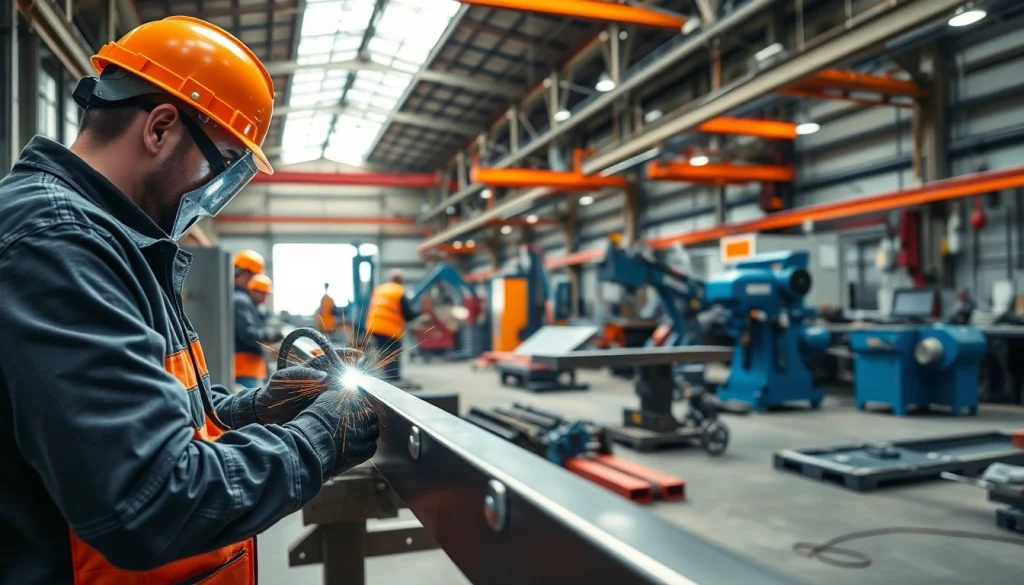Understanding Industrial Fabrication in Edmonton
Industrial fabrication is at the heart of many manufacturing processes, particularly in resource-rich regions like Edmonton. This field encompasses a wide range of services, from metal shaping to assembly, that support various industries in achieving their production goals. By focusing on industrial fabrication edmonton, businesses can leverage the expertise, advanced technology, and skilled workforce available in this vibrant city.
Definition and Importance of Industrial Fabrication
Industrial fabrication refers to the processes involved in constructing products from raw materials. It involves cutting, shaping, and assembling materials to create components used in larger systems or products. The importance of industrial fabrication cannot be overstated; it is essential for making everything from simple tools to complex machinery, thereby contributing significantly to a region’s economy and infrastructure.
Key Industries Utilizing Fabrication Services
Multiple industries in Edmonton benefit from industrial fabrication services, including:
- Construction: Structural steel fabrication is essential for buildings, bridges, and other infrastructure projects.
- Oil and Gas: Fabricated components are critical for pipelines, drilling rigs, and refineries.
- Manufacturing: Custom parts for machinery and equipment often require precise fabrication techniques.
- Transportation: Fabrication plays a role in creating components for vehicles, aircraft, and shipping vessels.
Common Materials Used in Fabrication Processes
The choice of material is fundamental in the fabrication process, influencing the final product’s quality and functionality. Common materials include:
- Steel: Widely used due to its strength, durability, and versatility.
- Aluminum: Lightweight and corrosion-resistant, making it ideal for certain applications.
- Plastics: Frequently used for their flexibility and resistance to corrosion.
- Composites: Offers a combination of properties that can be tailored for specific needs, particularly in high-performance applications.
Major Techniques in Industrial Fabrication
Welding Methods and Their Applications
Welding is one of the most critical techniques in industrial fabrication. Various welding methods are employed based on material type and application:
- MIG Welding (Metal Inert Gas): A versatile method suitable for many materials, it provides strong and durable welds.
- TIG Welding (Tungsten Inert Gas): Ideal for precision work, especially with thin materials and non-ferrous metals.
- Stick Welding: A more traditional method that is portable and effective for field work.
Cutting and Machining Processes Explained
Cutting and machining processes are vital for shaping raw materials into usable parts. Common methods include:
- Laser Cutting: Offers high precision and clean cuts, commonly used for intricate designs.
- CNC Machining: Utilizes computer-controlled tools to achieve detailed specifications and repeatability.
- Plasma Cutting: An efficient alternative for cutting thicker materials and metals.
Assembly Techniques for Enhanced Durability
Once fabrication is complete, assembly techniques play a critical role in ensuring the final product’s durability and functionality. Techniques include:
- Mechanical Fasteners: Utilizing bolts and screws for ease of disassembly and repair.
- Adhesives: For bonding dissimilar materials without altering their properties.
- Interlocking Designs: Allows components to fit securely without external fasteners, enhancing durability.
Benefits of Industrial Fabrication for Businesses
Cost-Effectiveness of Custom Solutions
One of the primary advantages of industrial fabrication is the ability to create custom solutions that meet specific business needs. Custom fabrication can eliminate waste and reduce costs in the long run by precisely designing components that fit perfectly into existing systems or products.
Increasing Efficiency through Precision Engineering
Industries that utilize precision engineering through fabrication techniques often experience increased operational efficiency. Accurate engineering minimizes errors, reduces material waste, and streamlines manufacturing processes, leading to faster production times and higher output rates.
Enhancing Product Quality and Reliability
Fabrication expertise ensures that products not only meet quality standards but often exceed them. Skilled fabricators focus on meticulous workmanship and implement quality control measures, resulting in reliable and superior final products that build customer trust and brand loyalty.
Challenges in Industrial Fabrication in Edmonton
Finding Skilled Labor and Training Opportunities
One of the formidable challenges faced by the industrial fabrication sector is sourcing skilled labor. While Edmonton boasts various training programs, the demand often outpaces supply. Initiatives to promote vocational training and apprenticeships could enhance skill levels in the workforce.
Regulatory Compliance and Safety Standards
The fabrication industry is heavily regulated, requiring strict adherence to safety standards and compliance. Navigating these regulations can be challenging for businesses, necessitating ongoing education and training to ensure all workers are informed and compliant.
Supply Chain Issues Impacting Production
The complexity of supply chains can result in delays and increased costs for fabrication businesses. Developing versatile sourcing strategies and building strong relationships with suppliers can mitigate these challenges and enhance adaptability in production.
Future Trends in Industrial Fabrication
Technological Innovations Shaping the Industry
Emerging technologies such as artificial intelligence, machine learning, and advanced robotics are transforming industrial fabrication. These innovations facilitate increased automation, resulting in higher productivity and more consistent quality standards.
Sustainability and Eco-Friendly Practices
The emphasis on sustainability is becoming central in fabrication processes. Companies are exploring eco-friendly materials and energy-efficient practices, which can not only reduce the environmental impact but also appeal to an increasingly eco-conscious consumer base.
The Rise of Automation in Fabrication Processes
The trend towards automation in industrial fabrication is reshaping the landscape. Automated systems enhance production efficiency, reduce labor costs, and improve workplace safety while maintaining or even improving quality and precision.
